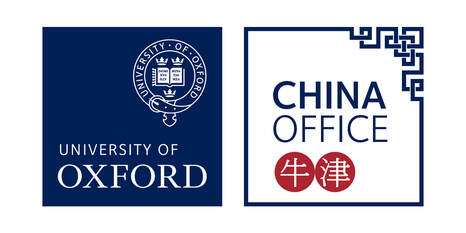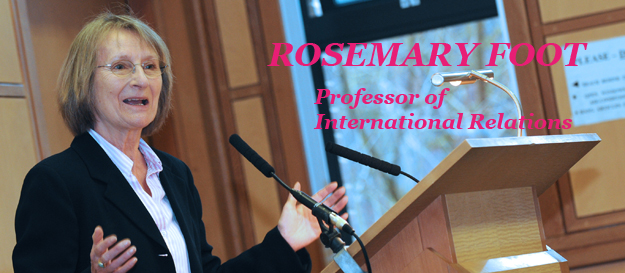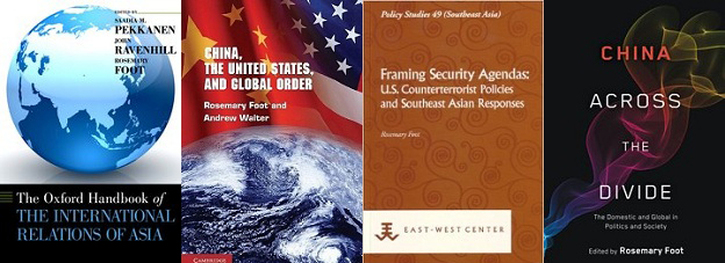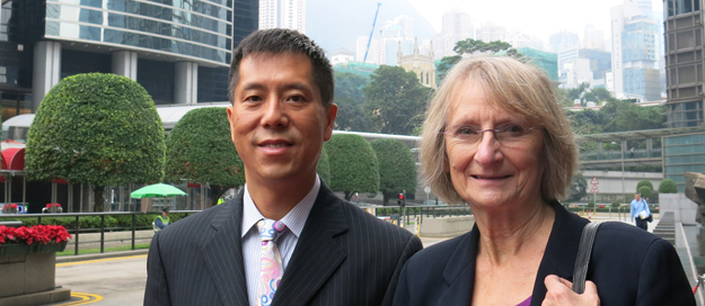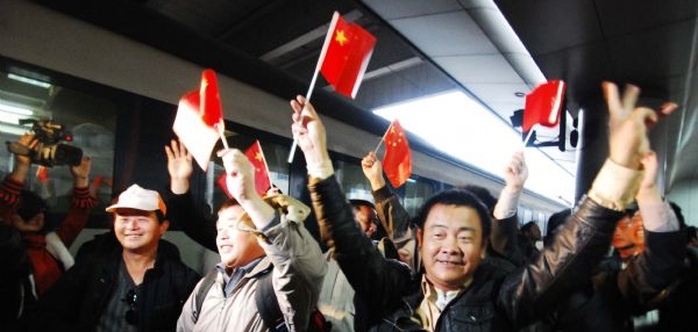Oxford China Academics
Oxford In China > Oxford China Academics > Rosemary Foot
Rosemary Foot was elected to an Emeritus Fellowship of St Antony's College in October 2014. In addition, she has been awarded a Senior Research Fellowship in the Department of Politics and International Relations at Oxford, and has become a Research Associate of the University’s China Centre. Previously Professor of International Relations and the John Swire Senior Research Fellow at St Antony's College, she has been a Fellow of the College since 1990. She was Senior Tutor from 2003-2005, and was Acting Warden of the College in academic year 2011-2012.
In 2014, she held the Visiting Chair in Strategic Studies at the University of Victoria in Wellington, New Zealand, and a Visiting Fellowship at the Nobel Institute, Oslo, Norway. She has been a visiting scholar at Columbia University, Renmin University in Beijing, Princeton University, University of San Francisco, Harvard University, the S. Rajaratnam School of International Studies, Singapore and Fudan University in Shanghai.
Professor Foot studied at the University of Essex, the London School of Oriental and African Studies, and the London School of Economics and Political Science where she completed a PhD degree in 1977. Prior to joining Oxford, she was Lecturer in International Relations at the University of Sussex, in the School of English and American Studies, acting as Sub Dean of the School from 1985 and 1987. She was elected a Fellow of the British Academy in 1996. Professor Foot's most recent publication is The Oxford Handbook of the International Relations of Asia, co-edited with Saadia M. Pekkanen and John Ravenhill (2014). In 2013, her edited book China Across the Divide: The Domestic and Global in Politics and Society was published, and in 2011 she co-authored China, the United States, and Global Order with Andrew Walter. Her principal research interests are in the International Relations of the Asia-Pacific, particularly security policies, human rights, regional institutional and normative developments, and US-China relations.
In 2014, she held the Visiting Chair in Strategic Studies at the University of Victoria in Wellington, New Zealand, and a Visiting Fellowship at the Nobel Institute, Oslo, Norway. She has been a visiting scholar at Columbia University, Renmin University in Beijing, Princeton University, University of San Francisco, Harvard University, the S. Rajaratnam School of International Studies, Singapore and Fudan University in Shanghai.
Professor Foot studied at the University of Essex, the London School of Oriental and African Studies, and the London School of Economics and Political Science where she completed a PhD degree in 1977. Prior to joining Oxford, she was Lecturer in International Relations at the University of Sussex, in the School of English and American Studies, acting as Sub Dean of the School from 1985 and 1987. She was elected a Fellow of the British Academy in 1996. Professor Foot's most recent publication is The Oxford Handbook of the International Relations of Asia, co-edited with Saadia M. Pekkanen and John Ravenhill (2014). In 2013, her edited book China Across the Divide: The Domestic and Global in Politics and Society was published, and in 2011 she co-authored China, the United States, and Global Order with Andrew Walter. Her principal research interests are in the International Relations of the Asia-Pacific, particularly security policies, human rights, regional institutional and normative developments, and US-China relations.
My path to Oxford
I studied Politics and International Relations for my undergraduate degree at the University of Essex. This was in the late 1960s and early 70s. In courses on comparative politics, we were encouraged mostly to read about Britain, the US, France and the former Soviet Union. At that time, China was going through its Cultural Revolution; thus it was very much in the news. I included some material about China in my essays, and became intrigued by the country. For my next degree—a master’s degree at SOAS (London School of Oriental and African Studies)—I decided to major in Chinese politics, history and sociology. I then went to LSE (London School of Economics and Political Science) for my PhD in International Relations. The thesis topic, on Sino-Soviet Relations, examined the impact of their dispute in the 1960s and 1970s on neighbouring countries. I would not describe myself as a sinologist. I am really a generalist working on the international relations of the Asia Pacific.
I studied Politics and International Relations for my undergraduate degree at the University of Essex. This was in the late 1960s and early 70s. In courses on comparative politics, we were encouraged mostly to read about Britain, the US, France and the former Soviet Union. At that time, China was going through its Cultural Revolution; thus it was very much in the news. I included some material about China in my essays, and became intrigued by the country. For my next degree—a master’s degree at SOAS (London School of Oriental and African Studies)—I decided to major in Chinese politics, history and sociology. I then went to LSE (London School of Economics and Political Science) for my PhD in International Relations. The thesis topic, on Sino-Soviet Relations, examined the impact of their dispute in the 1960s and 1970s on neighbouring countries. I would not describe myself as a sinologist. I am really a generalist working on the international relations of the Asia Pacific.
I then moved to work for a short while for the UK civil service, before working on fund-raising for UNICEF. After that, I returned to academia as Lecturer in International Relations at the University of Sussex, and developed a research interest in US – China relations. In 1990 I was given the opportunity to join Oxford in primarily a research role. The Senior Research Fellowship at St Antony’s College was funded by John Swire and Sons Ltd and I stayed in that position for over twenty years, becoming a full Professor in 1997. The post also involved teaching MPhil students in the International Relations programme, and I offered an MPhil Option, ‘The International Relations of East Asia’. During the academic year 2011-2012 I was Acting Warden of the College, while Warden Margaret McMillan took leave to write her much-admired book on the origins of the First World War. While I’m not a natural academic administrator, I was glad to have contributed to the College in that way before I retired. The College and University association has been very enjoyable. I have great colleagues at the College, in International Relations, and in the China Centre. I calculate that I supervised 29 research students (DPhil mostly) from 13 different countries. 14 of these are women, and I am delighted to have had some role in promoting female representation in the subject matter of IR. These doctoral students have now gone on to a variety of jobs around the world. Wang Hao, who is now Managing Director and Global Head of Institutional Sales at Bank of China, was my first doctoral student. He was able to come to Oxford from China because of a generous scholarship from the Swire company.
My links with China.
I first travelled to China in 1974. The UK established full diplomatic relations with China in 1972 which helped to make the trip possible. It was the last year, more or less, of China’s Cultural Revolution. Back then you could only travel to the PRC as part of a tour group, although I did manage to venture out by myself in Shanghai. Things were very basic at that time. There were hardly any street lights at night in the major cities, and most people travelled by bicycle. But everything was very clean and tidy and the Chinese we met on the tour were extraordinarily friendly and hospitable. I also came to China in 1986 to teach as part of an exchange programme between Sussex University and Renmin University, and I’ve travelled many times to China since then. Having witnessed the dramatic changes in China since the Reform and Opening policy has made me aware of how far the country has come and how much it has achieved.
The rise of China has affected the discipline of International Relations. In the 70s and 80s, it was easy to keep on top of the broad subject of China’s foreign policy. Now, China is a major presence in all continents of the world. It is the second largest economy in the world; its foreign policy has many dimensions associated with it – for example, investment, energy, the environment, and aid. There are so many specialist topics that keeping abreast of all of these has proven to be a challenge. Many International Relations specialists have come to perceive China as an important case study that hitherto they had neglected in the broader thinking about the disciplinary subject area. So, there are more academics writing about China than ever before, and more topic areas to consider. One of the central research questions that has arisen involves an assessment of China’s contribution to global order, and whether its resurgence represents a normative challenge to the post-1945 order that we have become familiar with.
More wide-spread commercial, energy and security interests means that China will have to more interventionist with respect to other countries.
China in 2020
There are many possible scenarios. Economic initiatives like the Asian Infrastructure Development Bank and the Maritime Silk Road Economic Belt may be difficult to implement, but if China can focus on its western regions and on pursuing initiatives through central and southern Asia to Europe, we will witness a significant shift away from its long-term focus on the US and the Pacific. Its growth rates are slowing, and an economic setback cannot be ruled out, but fulfillment of these large-scale projects holds out some prospect of a more Sino-centric world economic order. Projections are always a dangerous occupation of course. Another major prospect is greater Chinese attention to the fate of its citizens living and working overseas. China’s leadership has referred often to its adherence to the idea of non-interference in the internal affairs of other countries. But with its global interests and its growing overseas investments, it will have to take a more active role. The citizens of China now expect to be protected by their government. Until the crisis in 2011 in Libya, many people were not aware that there were 30,000 Chinese people working there. More wide-spread commercial, energy and security interests mean that China will have to be more interventionist with respect to other countries.
Internationalization through education
China is definitely interested in this type of internationalization. Not only are vastly increased numbers of Chinese students studying overseas, but China is now also offering master’s degree courses in English in some of their best universities. Students who do study overseas have different experiences of course, and some are more affected by that experience than others. But the openness of China to the outside world is something to be encouraged and something from which we all can benefit.
My advice to Chinese graduates returning to work or study in China is not to take anything for granted. Question everything, gather the evidence, and try and look at the world from different perspectives. I hope that students from anywhere in the world returning home after their studies at Oxford would continue to challenge the received wisdom, and to look at the world in a nuanced way.
The best piece of advice I've been given
It can be very lonely working as a woman in academia, particularly in the field of International Relations. It would be easy to retreat into a shell. So the most helpful piece of advice I was given was that I’ve got a contribution to make and that I should make it.
It can be very lonely working as a woman in academia, particularly in the field of International Relations. It would be easy to retreat into a shell. So the most helpful piece of advice I was given was that I’ve got a contribution to make and that I should make it.
Interviewed in December 2014
